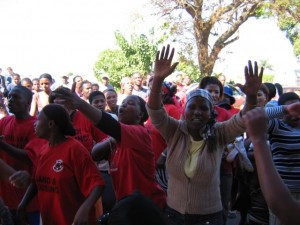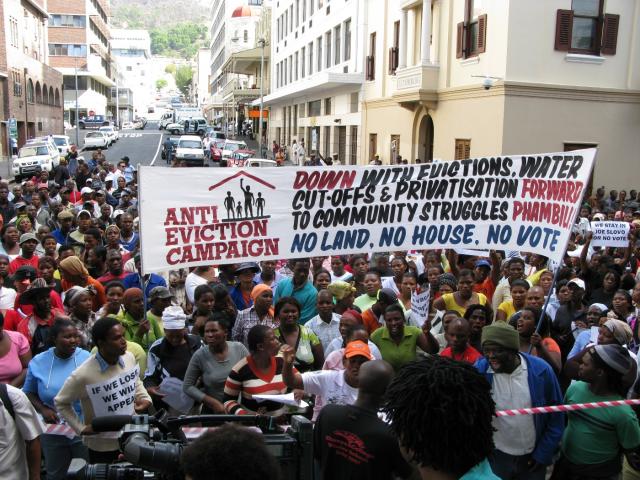The Anti-Imperialist South Africa: A Revolution in Progress
The Anti-Imperialist - Posted on Sunday, January 9, 2011 18:58 - 4 Comments
Since the fall of apartheid in South Africa, many of its people feel it was a revolution betrayed. Access to basic services such as healthcare, housing, electricity and water has been cut hugely as a result of privatisation. Privatisation and labour market flexibility have also led to enormous job losses and widespread poverty and inequality, worse than that under apartheid.
The Anti-Eviction Campaign (AEC) is a grassroots organisation in South Africa which employs a combination of legal and direct action in defence of rights to housing, water and electricity. Adam Elliott-Cooper and Abena Agyepong caught up with Ashraf Cassiem, one of the spokespeople of the campaign, to learn more about their work.
Could you tell us about some of the work the AEC is involved in?
We don’t want to do legal work. The reason we do legal work is because [the government] force us into courts, and that’s the only time we participate in legal work. We have a legal co-ordinating committee called the Campaign for the Recognition for the Fundamental Right to a Home which enables us to participate in that space. The AEC don’t want the courts to be a space that [the government] controls, so we go into the space they take us to. We do not depend on the courts to protect us from eviction because of the nature of the law. It is a Dutch law, which is about property and we don’t have any property, so usually it doesn’t work for us but we participate there to make sure that we engage in the space that is available. The legal struggle for social justice, land and housing, social services, education and healthcare and the likes of that is 0.00001% of the struggle for the Poor People’s Alliance, so it’s really nothing. We just go there because they take us there.
The anti-eviction campaign is based upon direct action, its inception was based on direct action, and we’re trying to follow through on the power that that brings. We win all the time with direct action, it brings power to the person enacting out whatever is being acted and it also brings power to the community because it also brings collective action.
Could you tell us a little bit about the actions the AEC organises?
We have a principle in the Poor People’s Alliance that says: “Nobody must talk for us, everybody must talk to us” so that’s why we had the Coffin for Councillor to show him or her that they don’t speak for us. So it’s very simple, you have a coffin made of wood or plastic, you put the councillor’s name on it and you invite him or her to receive the memorandum and instead of giving the memorandum you have the procedure of a funeral. Everybody participates, you even have a mother, children crying, we have wailers crying and stuff. And then when we’re done with the funeral, before we leave, each participant in the action will come up with piece of paper with their demand on, and you just walk up to the coffin, put in the piece of paper and then leave. It’s almost like you’re going to see the face or something at a normal funeral, except the person you’re going to see is standing at the foot of the coffin. So we found that very creative and more effective because then everybody stands up and takes note, even the media.
 We understand that there have been a lot of problems with people not being able to pay their water and electricity bills, so I know you guys have been finding ways of helping people to deal with those kinds of issues as well
We understand that there have been a lot of problems with people not being able to pay their water and electricity bills, so I know you guys have been finding ways of helping people to deal with those kinds of issues as well
Of course, we have water bills, electricity bills, rent, all different things dealt with by our ‘Scrap Arrears Campaign’. We found, in a policy that used to be called the ‘Pro-poor Policy’, now called the ‘Credit Control Debt Management Policy’ that a section in it that says: “To declare debt irrecoverable”, so there is a section in this piece of policy that presents an opportunity to declare debt irrecoverable. So what we do is we print the law on the front of a pamphlet, and on the back of the pamphlet show you how to do the application and we distribute it to everybody, so anybody can just pick up the pamphlet fill in the form, so you can apply to have you’re debt declared irrecoverable.
It hasn’t been very successful. We’ve had it since 2002, and have been trying to have it implemented, but what success we have had is the mayor of Cape Town has scrapped arrears until 2004. This is because the Mayor doesn’t want to implement that policy, which means everything will be scrapped, so instead of scrapping everything, the mayor gave a mayoral edict that declares all debt before 2004 gone. However we’re saying ‘not until 2004, all arrears must be scrapped, of poor people’, because they live off grants or casual labour, so there’s no income really in poor communities
Could you perhaps tell us a little bit about the kind of popular education that takes place with the AEC and the Poor People’s Alliance?
In the Western Cape Anti Eviction Campaign we had a school in a community in Mandela Park do the popular education. The Paulo Freire form of education.
We sometimes invite “clever” people or “intelligent” people like professors and stuff that know about the issues. We try to invite people who think positively about these things, and we share. We have readings of different books, or passages of different books, we try to workshop it, understand it and implement it. But our school was closed down because the students that were accepted at our school were not being accepted at other schools because they could not afford the school fees. The teachers at our school were all unemployed teachers who couldn’t get work. But our school was closed because the government then employed all those teachers and they placed all the students into different schools in the area. So in one way we did achieve education for the youth, and a job opportunity for an unemployed teacher but now the popular education is not there.
In (Kwa-Zulu) Natal we have what they call ‘Living Politics’, which we try to spread around South Africa. It’s the living politics of people, rather than the politics of great thinkers. Like instead of having Marxism or something, we have a lesson about our community. So that is what we call ‘Living Politics’, real life politics. Not the politics of anybody, but the politics of our community. And that is what we’re saying is the kind of education that we need to be spreading throughout South Africa because it’s our own education, our own understanding of things that we want to have implemented. And that’s more powerful because usually policies and procedures are for the powers that be, and people like us don’t want to have these policies and programmes but we are forced to. So now we’re saying that we don’t want to worry about that, we want to talk about our politics. So we’re talking about living politics. Living and learning real things. Not abstract, but real things.
You’ve said in the past that 90% of the AEC are women. In what ways does the AEC address gender issues?
In the post-apartheid struggles that we found ourselves in, we found that women bear the brunt of all the different issues that we deal with – education, healthcare, land and housing, water – women have to carry it on their shoulders. That’s why we say at the AEC “only those that feel it, can lead it”, so who else feels it? It’s the women that feel it, which is why we promote women into leadership to change the existing dynamics. It’s not to be told to be co-ordinators or be sent to places by other people, but to actually be elected as chair persons in the community, as chair persons of a programme, which means we often create sub-committees in order to change the dynamics in our community.
How effective has your message been in promoting women to these different positions?
In the AEC we have twelve co-ordinators, of which six are women and purposely, we make sure that we have equal representation and maintain the gender balance. When we go out to different communities we make sure that there is a gender balance where women speak as much as men, so that we can change the roles rather than one being dominant and another being subservient. It’s a very practical thing, it isn’t complicated you just need to have the will to do it, have the patience to be able to do it, because historically, women’s position’s have been subservient. They may not have formal education, so you have to have the patience, but people are not illiterate, they can speak and organise.
We know that the Poor People’s Alliance is made up of a number of different groups in different parts of the country. Can you tell us about what is now a national movement in South Africa?
The AEC is in the Western Cape, which is the southern point of South Africa. Then in Kwa-Zulu Natal which is on the east coast of South Africa in Durban where we have our alliance partner Abahlali baseMjondolo which just means ‘people based in shacks’ and together we form the action alliance. It is an alliance of actions. We might not have meetings, but we have actions in support of each other. In Harry Gwala we have an alliance with the Landless Peoples’ Movement. In the rural part of Free State and Kwa-Zulu Natal we have an alliance with the Rural Network. All of these are direct action organisations. Together, we form the Poor Peoples’ Alliance in South Africa.
The AEC, for the last 10 years has been trying to affiliate with other organisations from all over the world so last year we started the Chicago anti-eviction campaign, in North America. In Miami we have an alliance with the ‘Take Back the Land Programme’ which is in 12 other states as well. We don’t have the resources to be consistently linked, but the intentions are there, and the will is there and that’s how we know what is happening. In Austria there is a promise to start an anti-eviction campaign because of the threat of the implementation of pre-pay electricity metres. In Germany we work with the anti-Fascist network in Berlin, Hamburg, Stuttgart, Frankfort and Dresden. In Zimbabwe we participate with the Uhuru Network which is a very radical youth group that have been criminalised and brutalised for a long time, and still probably is. In London, we’re trying to further discussions with some direct organisations like London Coalition Against Poverty. We’re trying to go all over the world because we’re trying to show that poor people are in defence of other poor people.
In the AEC and Abahlali we have a logo that says “The poor protecting the poor – together fighting for basic needs”, so we think that applies throughout. And we want to promote it throughout the world. Not to a mass membership, but to a mass action.
Abena Agyepong is an independent journalist, presenter and social entrepreneur
Adam Elliott-Cooper, a writer and activist, is Ceasefire Associate Editor. His column on race politics appears every other Sunday
4 Comments
Jesica
Adam
So mass unemployment is due to having too many children, rather than economics. Thanks for that Jessica, perhaps some form of eugenics programme is in order?
StinkyMonkey
Wow, Adam, for someone who’s not from South Africa you seem to know everything…
Generally speaking, I think even you will agree that it is a tendency for poor people to have loads of children, while rich people have less. It’s a fact that the developed countries have lower birth rates than developing countries. Maybe richer people are more selfish, maybe they have better access to contraceptive measures, etc. I don’t know.
What I do know, is that I am from South Africa. I was born and bred here with a liberal background. But I agree wholeheartedly with Jessica. I am white and highly qualified and I have to see hundreds of jobs advertised as “AA” only, so I can’t even apply. Now look at the people in our government, I’ve heard of the Accounting Officer at a municipality in the Free State who can’t even write.
So face it, black people have loads of advantages. Even if they don’t have money to study, it’s a given that you’ll get a bursary if you really want to (I audited a local University’s bursary processes, so don’t even try and say I don’t know what I’m talking about), or at the least a loan. My wife studied with a loan, her family couldn’t afford for her to study, and yet she made a plan.
Which brings me to my point.
There are many oppurtunities for black people in this Country, more so than for white people. But they have way too many children and have a feeling of being entitled to everything (would a caveman have sat on his arse and said – “I have a right to food, I’m not going to hunt today”).
And don’t try calling me a racist – can you point out one white person on any of those photos in the article?
Don’t talk about something you know nothing about.
Ras_Hein
Nationalization!! Return the Land to the Natives Now!,, We want Our Minerals! white monopoly capital will cease to exist! Africa The Dominant Factor



If they used the opportunities they had and had less children they would have been in a much better position. It’s just so much easier to always blame somebody else for your problems. They will never achieve anything as long as they choose to not take responsibility for there own actions.